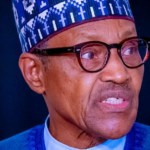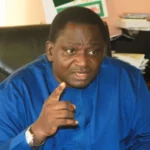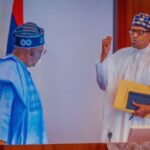The recent approval of the Federal Executive Council for the $1.9 billion rail line that will link Kano to Maradi in the Niger Republic through Dambatta in Kano State, Kazaure in Jigawa State, Daura and Jibia in Katsina State attracted lots of discussions and opinions largely reflective of Nigerians negative narration and perceptions of all government pronouncements especially those by President Muhammadu Buhari.
There is the general belief that some elite wants to make sure all intentions of Buhari’s administration are given negative connotations. Government policy statements and programs like the RUGA project, Ajakuta-Kaduna-Kano Gas pipeline, the recent Water Bill have attracted lots of divisionary statements and criticisms among the elite who in most cases are blinded by primordial considerations, intellectual laziness and or deliberate attempt to give the wrong information so as to mislead the public into turning against the government for political considerations or pure mischief.
The economic viability of the Kano-Daura-Katsina-Jibia-Maradi rail line has been called to question in many fora in the social, electronic and print media and the conclusion of most of these opinion-makers was that the rail line was conceived purely on primordial consideration and therefore of no economic value, and unfortunately, many gullible people quickly swallow their thrash and start crying all over social media.
What many do not care to know, is that there is the African Continental Free Trade Area (AfCFTA) agreement signed by African countries to develop Africa and link the whole continent together via rail, road and air.
All signatory countries are expected to develop a link railway to terminate at each other’s border. This means Nigeria will construct its own rail up to its border with Niger, Republic of Benin and Cameroun while the other countries will do the same.
Buhari also saw a big opportunity to position Nigeria and keyed into this AfCFTA fully. Unfortunately, most Nigerians do not care to study government policies and as a result, many do not know that there is a document called ERGP (Economic Recovery and Growth Plan), which has been improved upon and called APC NEXT LEVEL AGENDA. It is this Agenda and AfCFTA combined that PMB is implementing jointly, to turn Nigeria into a manufacturing and producing nation, a huge economic hub for Africa.
With the creation of massive infrastructure in rails, roads, sea and air Nigeria is gradually developing infrastructurally in a way that when we produce, we can also transport the products across to boost our economy along the trade corridor emanating from Lagos to Jibia through Kano called the LAKAJI.
The LAKAJI corridor was named from the three largest cities along the trade route (Lagos-Kano-Jibia) and it runs along eight major states: Kaduna, Kano, Katsina, Kwara, Lagos, Niger, Ogun, and Oyo States. The corridor (LAKAJI) runs for about 1,225-kilometre transport route and over 64 million people live along it, accounting for almost 30 percent of Nigeria’s population. The corridor serves three major functions: internally linking the larger producing areas in northern Nigeria to the most populated centers in the south, exporting and shipping goods produced along the corridor and importing and distributing goods from the shipping ports of Lagos to central and northernmost states of Nigeria. Average annual daily traffic on the corridor ranges from 17,000 vehicles between Lagos and Ibadan in the south to 5,000 vehicles between Abuja and Kano in the north with about 10-14 percent of the traffic made up of heavy vehicles.
The Corridor is said to be Nigeria’s busiest transport corridor facilitating the movement of 30 million tonnes of goods per year valued at more than $6 billion and accounting for 36 percent of the country’s total Gross Domestic Product (GDP). Because it is a major conduit for food supplies from the North to the South, it is also a vital channel for food supplies to neighbouring countries in Niger, Chad, Cameroon, Benin. Experts agreed the area has the potential to stimulate investment in Nigeria’s agricultural sector, linking the largest consumer market in West Africa (Lagos) with some of the highest potential agricultural zones in the region. About 33 commercially viable and relevant high priority agribusiness investment opportunities have been identified across LAKAJI, separated by state and investment categories (Inputs, production, processing, manufacturing, warehousing & infrastructure, and information and communication technologies (ICT)).
A baseline study conducted by USAID on the LAKAJI corridor further revealed that it costs over $3,000 and takes approximately 12.5 days to send a 20-foot container from Jibiya in northern Nigeria to Lagos in the southwest. Conversely, it costs nearly $5,000 and takes approximately 19.5 days to ship a 20-foot container from Lagos to Jibiya. This arose mostly in port clearance charges and this has discouraged use of Nigeria Ports by Niger and other neighboring countries. The overall cost and delivery times along the Lagos-Kano-Jibiya corridor are significantly greater than similar corridors in West Africa.
The cost of rail transport from Lagos to Kano is currently USD 0.045 per tkm (NGN 7.1 per tkm), plus the cost of insurance at 0.25 percent of consignment value. Keeping all other conditions constant on the corridor, including the vehicle transport cost from Kano to Jibiya and the informal fees along the way, using rail from Lagos to Kano could save the shipper USD 1,195 per consignment. Railway, therefore, offers the cheapest alternative to road transport that will reduce costs and times of delivery of goods from port to the hinterland and neighboring countries.
The proposed railway was conceived on the LAKAJI trade corridor that was identified as an economic corridor in 2013 by the USAID NEXT LAKAJI Investment Corridor Project. The project, convened LAKAJI Agricultural Growth Corridor Investment Summit in 2013 where 230 Nigerians and international participants representing agribusiness firms, agro-allied industries, farmers, banks, investment funds, among others were brought under one roof. The summit featured in-depth discussion of the potential of the Lagos-Kano-Jibiya Corridor to serve as a magnet for investment in Nigeria’s agricultural sector. It identified the corridor as a key route for moving agricultural crops critical to food security and articulated the features of transforming LAKAJI Corridor from a congested single strand of road way into a multi-strand combination of road, rail, air, power and ICT – a multi-modal trade expressway with junctions for off-corridor states and other key agri-processing clusters. The concept envisages the entire corridor from Jibiya to Lagos designated as a free zone for agri-processing and related services. It further promoted the combination of Nigeria’s other investment features, appropriate pro-business policies and improved trade facilitation because of the corridor’s ability to attract significant investment.
Abdullah is Special Adviser on Agriculture and Natural Resources to the Katsina State Governor
(08033201198, [email protected])
Establishing a rail line along the corridor will therefore turn it into a bimodal network (roads and railways) and to make it more efficient and transformational.
A number of Nigerians have asked why Kano – Maradi rail line? The answer to this question can best be explained by looking into the agro-trade sector on the economies of both Nigeria and Niger. The southern part of Niger (Maradi axis) and northern Nigeria form one cereal production basin in which markets perfectly integrated and products circulate easily. The Kano–Katsina–Maradi corridor represents the axis around, which the whole area gravitates. Part of the cereals bought by Nigerians in Niger are stocked in Maradi are up to 5,000 tons, while those from Dawanau in Kano can exceed 10,000 tons. The volume of trade that happens here is intensive, but largely informal.
In a Nigeria – Niger Joint Commission meeting, the extension of the corridor to Maradi in the Niger Republic was first initiated and the issue of Niger Republic goods transiting through Nigerian Ports and as well as the facilitating movement of these goods through the Nigerian transit corridor featured prominently. In relation to this aspect, several delegations from the Niger Republic have visited Nigeria in the past to complain about the problems militating against the use of the Nigerian Ports by the Niger Republic Economic Operators. Although the corridor is linked at present by road, the establishment of a rail line will go a long way in facilitating the movement of transit goods through the Nigerian corridor.
At the Katsina State Economic and Investment Summit in 2017 the National leader of the All Progressives Congress (APC), Asiwaju Bola Tinubu, who has the economic and political development foresight for Nigeria, urged the federal government to pay more attention to the LAKAJI corridor to ease trade.
In the Borderless Conference in 2014 in Lagos, Ambassador Martin Brennan (rtd) in a similar tone noted that the high cost of transportation of goods from the southern part to the northern part of the country. He said it is 25 percent higher than transporting goods in some parts of the US and 100 percent higher in some other areas of the US. The former envoy said Nigeria can do better in her efforts to leverage growth through the ATA but that the inflated time and cost of transport along the LAKAJI corridor are delays and inefficiencies that are undermining the achievements of the agenda.
The present government awarded contracts of the rail line from Lagos to Ibadan and is nearing completion, that of Ibadan to Kaduna has been awarded, Kaduna Abuja is operational and linking Kaduna to Kano is on. What remains now is to link the remaining part of the corridor, i.e. Kano to Jibia and Maradi. Daura is outside the loop but forms part of the loop’s branch, just like Dutse in Jigawa State. Daura is along the Nigeria-Niger livestock route while Dutse is one major source of grains supplies to the corridor agri-trading complex.
Therefore,the Kano–Maradi segment completes an economically strategic railway corridor between the Sahel-Sahara region and the Nigerian southern coast. Rather than attempting to politicise or ethicise this forward-looking strategic effort of government, we should rally to hold it accountable and responsible in delivering results.
I do not have any doubt that in the days ahead, we shall toast President Buhari for his foresight in the infrastructural development especially the railways along the corridor and other strategic economic routes in the country.

 Join Daily Trust WhatsApp Community For Quick Access To News and Happenings Around You.
Join Daily Trust WhatsApp Community For Quick Access To News and Happenings Around You.


